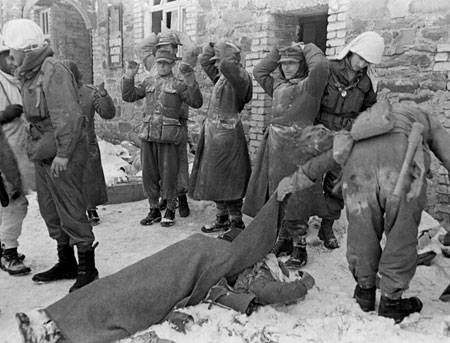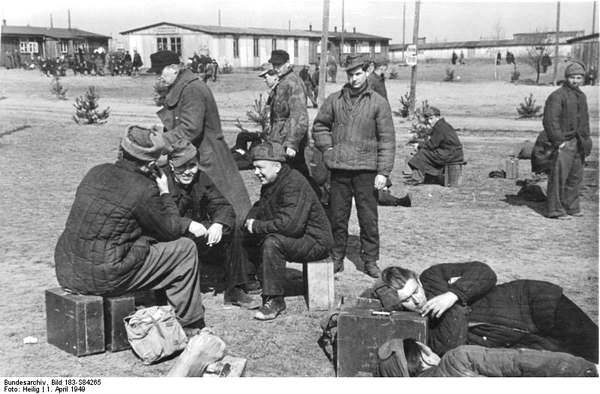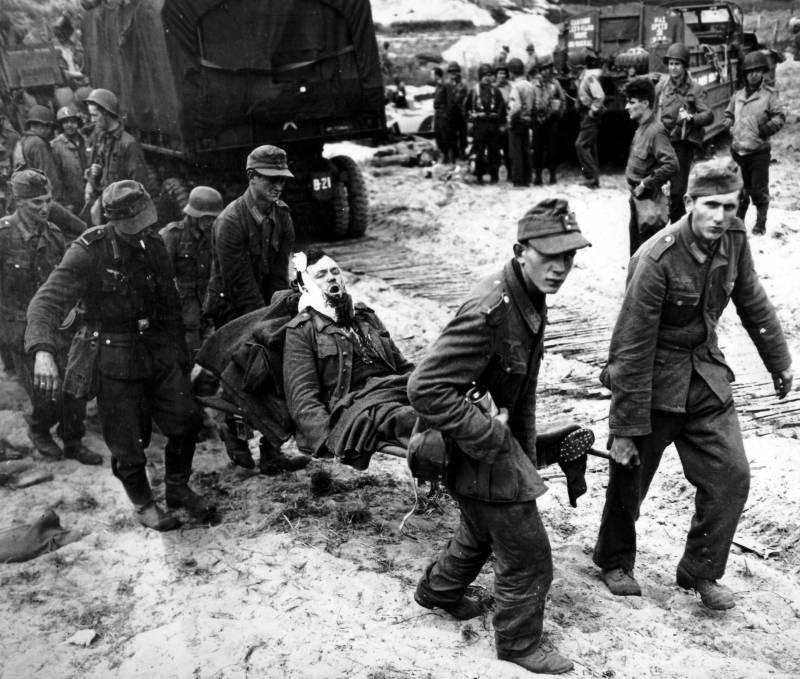Special contingent. Part of 3

The order for the troops of the Supreme Military District about the burial of the corpses of enemy soldiers and officers from 22 in February 1943, ordered to finish it in a seven-day period. The whole area, including the city, was divided into areas that were divided into military units in the following order: the city of Stalingrad, from the southern borders to the Tsaritsa River and the Gumrak, Nursery, Novy Rogachik, Rakitino, Peschanka regions - 64-I army; the center of Stalingrad - the 7 th infantry corps, as well as all parts located in the area; from the Oil Sindicate to Latoshinka, as well as the Razgulyaevka and Sheds crossing - 62-I Army; Gorodishche - Orlovka - Yerzovka area - state farm, Kotluban - Samofalovka - New Hope - 66-I army. In the rest of the regions, the cleaning of the corpses was entrusted to Kalachevsky and Gorodishchensky district military commanders, who were assigned for this purpose by a platoon of fighters.
Also, for the commanders of the 62, 64, 66 armies and the 7 infantry corps, they were ordered to allocate the sappers and demolition men in the required quantity and provide them with vehicles. This was due to the fact that, due to the laboriousness of the work on digging trenches for mass graves, it was necessary to carry out these works with the help of explosions. For this purpose, the teams of sappers were involved. The organization of work was entrusted to the chief of the city headquarters of the local air defense Colonel Shevalgin.
Responsibility for the selection of burial sites and control over the observance of the rules were assigned to the city health inspector Dr. Litvinov. The head of the general sanitary control over the cleaning and burial of corpses was entrusted to Dr. Petrov and the head of the sanitary service of the Military Air Force, 1 military doctor of the rank of Henkin. For the burial of corpses, the head of the POW camps department was ordered to assign 500 prisoners of war.
Soviet special contingent
Due to the fact that in the summer of 1941, about 2 million Soviet soldiers (49 percent of the total number of prisoners of war for all the years of the war) were held captive, the fact of captivity was perceived as a crime. The tragic experience of the outbreak of war predetermined the desire of the Soviet authorities to organize a system of verification of those who returned from captivity or the environment.
27 December 1941 of the year issued a decree of the USSR State Defense Committee (hereinafter - the State Defense Committee) No. 1069cc, which obliged the NKVD of the USSR to create special camps (hereinafter - special camps) in the Vologda, Ivanovo, Tambov and Stalingrad regions. Subsequently, the organization of the elimination of special camps were associated with the situation at the front.
According to the order of the NKVD of the USSR No. 001735 of 28 December 1941, “On the creation of special camps for former Red Army soldiers who were captured and surrounded by the enemy,” special camps were formed within the Office of Prisoners of War and interned by the NKVD of the USSR.
Since the release of the above-mentioned documents, Soviet prisoners of war did not fall arbitrarily under the definition of "traitor to the Motherland." Their fault could be established only after verification. Despite this, they were called “former soldiers of the Red Army” (the terminology of the State Defense Committee decree No. 1069ss of December 27 of 1941), that is, they were placed outside the ranks of the Red Army. At the same time, in the documents of the board for the affairs of prisoners of war and interned by the NKVD of the USSR, separate special camps that returned from captivity or the environment were called “special contingent”.
During the period of the strengthening of the totalitarian regime in the USSR and the creation of a system of corrective labor camps, a different concept signified a category of people who were in conditions of secure institutions and carried out forced labor. Such an identification of Soviet soldiers with prisoners clearly indicates their de facto lack of law and negative attitude towards them.
The use of labor of the special contingent began already in 1942 during the construction of the Kamyshin-Ilovlya railway (part of the Volga Rokadnaya railway). However, the normative work of this category of workers was assigned only in April 1943 of the year. In accordance with the order of the NKVD of the USSR No. 00675 of April 6 of 1943, the offices of the camps of the USSR SVD camps were to organize the use of the work of the special contingent.
Soon after the end of the Battle of Stalingrad in the city, the special camp of the NKVD of the USSR No. 0108 was created. In March, 1943 of the year, it was opened in the village of Beketovka, Kirovsky district, but in May 1943 was moved to the Lower Village of the Traktorozavodsky District, in the immediate vicinity of the Tractor Plant, where it was supposed to use labor returned from captivity.
In June 1943, the first branch of a special camp in the Upper village of the Barrikadniy district appeared. The estimated number of offices was 1500 people.
From February 1944 of the year, the camp branch was supposed to begin work at the division of the economic department (hereinafter referred to as XOZO) of the USSR NKVD in the Stalingrad region - the construction department. In May — June, 1944 was planned to create a camp site for the maintenance of an 2000 man of special contingent at the Red October metallurgical plant.
The main part of the camp was located in the Lower Village in the unfinished, technician House destroyed during the war, 500 meters from the Volga River. The report of the chief of the special camp of the NKVD of the USSR No. 0108 FS Yemelyanov about the work of the special camp in the second quarter of 1943, it was indicated that the camp zone occupied an area of 33 600 square. m and was isolated from the plant and the local population, there was a living area - three kitchens and workshops.
The total living area of the camp office at the plant number 221, which was located in the Upper village of the Barrikadny district of Stalingrad, was 13 423 square. There was no roof in the building.
The conditions in which the special contingent of the special camp of the NKVD of the USSR №0108 during the Great Patriotic War lived were far from normal and contributed to the deterioration of physical condition. As follows from the memorandum of the doctor-inspector of the camp management section of prisoners-of-war of the Soviet Union of National Security and Defense Administration in the Stalingrad region from September 16 on 1943, the premises of the camp were in unsanitary condition. The residential zone of the special camp of the NKVD of the USSR No. 0108 was not removed, the premises were not glazed. Cooking places were not equipped: ““ there are a lot of flies, cutting tables and lids on food pots are dirty, the floor is not clean ”.
There were no necessary products in stock. The special contingent consumed water from the Volga, which was not subjected to heat treatment, but only chlorinated. In all the rooms of the treatment block it was dirty, there were not enough beds and bed linen. As a result, some patients were placed in common residential premises along with healthy ones. The medical inspector noted that the lack of sanitary conditions in the camp creates the danger of disease.

A year later, information on the camp of the NKVD of the USSR No. 0108 also indicated unfavorable conditions for the detention of former Soviet prisoners of war. Record keeping documents show that people slept on bare plank bins, clothing that was available was subjected to repeated repairs and came almost completely unsuitable for wearing. No special camp unit had a canteen, food was eaten in the open air or in residential premises.
The power level of the former Soviet prisoners of war of the special camp of the NKVD of the USSR No. 0108 was also not optimal. It is known that the contingent was issued on 600 grams of bread per day. However, this situation has developed in the conditions of funding special camps partly from the NKVD of the USSR, partly from the NPOs of the USSR. At the same time, the maintenance of workers in this category went 50 percent of their wages.
The living conditions of the special contingent remained poor even after the reorganization of the special camp of the NKVD of the USSR No. 0108 into the test-filtration camp department of the USSR NKVD in the Stalingrad region in February 1945 of the year.
Head of the camp branch I.I. Evdokimov, in a report for the second quarter of 1945, stated that the clothes he had had were dilapidated, and because of the lack of bedding, most of the former Soviet prisoners of war were forced to sleep on bare plank beds.
It should be noted that during the war years, such living conditions were inherent in most of the civilian population of the Soviet Union, with the only difference being that they were in a special camp could not independently improve their life. Under conditions of a secure establishment, they should have been kept until the end of the inspection.
During the existence of the special camp of the NKVD of the USSR No. 0108, more than 9 thousands of people underwent testing there. Special contingent was involved in the restoration of industrial enterprises of the city of Stalingrad, whose products were necessary for the front (Stalingrad Tractor Plant, Plant No. 221 Barricades, Red October Plant and others), as well as the restoration of the Stalingrad GRES and the construction of the NKVD Administration of the USSR. From June 1944, the contingent of the special camp of the NKVD of the USSR No. 0108 was also involved in housing construction. After the reorganization of the special camp of the NKVD of the USSR No. 0108, its relatively small contingent remained in demand and was used for various works at the Dynamo stadium, the confectionery factory No. 4, for cleaning the territories of schools, kindergartens and others.
In contracts concluded between the special camp of the NKVD of the USSR No. 0108 and construction organizations and enterprises, it was noted that the special contingent was needed mainly for construction and restoration work, that is, it was planned to use former Soviet prisoners of war as carpenters, bricklayers, builders and others. Special contingent was also involved in clearing areas from debris and shells.
At the same time, most of the former Soviet prisoners of war of the special camp of the NKVD of the USSR No. 0108 did not have construction specialties, but, on the basis of the conditions of the concluded agreements, were to carry out restoration work. This indicates that their work was unskilled and, as a result, labor productivity was probably at a low level. Often there have been cases of significant overruns. Thus, instead of the months established by 2-3, those who returned from captivity were delayed in a special camp for six months or more.
In their letters they addressed I.V. To Stalin: “Dear father and teacher, I want to briefly describe about my life and ask you to decide my fate. Or be me a warrior at the front, or a fighter in labor. " Telling your stories they tried to show that they were not guilty, but were victims of circumstances, that the period of their verification was unreasonably long. One of the former Soviet prisoners of war in the letter of I.V. To Stalin from 14, October noted: “Together with other comrades, I experienced (in German captivity) horror. We were beaten, starved, put in a tightly closed room without windows by 35-40 people, whereas the last one could accommodate 15 people. October 1 us, 40 men and 30 women, almost stripped on the head and taken away. We knew what awaited us. Nobody agreed to escape due to a depressed moral state. The car door opened and we saw a pit. Five people were called out of the car. Everyone was hiding one after another. The commander told us to jump into the pit and go face down. I worked out an escape plan. I hit the executioner in the face, knocked down. I was shot in the back. But I continued to escape. Ran to the village of Frunze. I lived there for several months until the German scum was expelled from the Rostov region and the city of Rostov. I was mobilized to restore the bridge over the river Don. Transferred to the Rostselmash plant. After working at the factory until February 28 1944, I was summoned by the military registration and enlistment office of the Stalin district and sent me to the special camp number 205 of Krasnodar for inspection. 13 of April of this year I was transported to special camp number 0108. Here I am on the present. By specialty, I do not work. And besides, I cannot know what is my fault, why I am being kept in a camp. Of course, maybe this is so necessary, but it is amazing that my wife was subjected to some kind of interrogation about my adventures. Dear Comrade Stalin, decide a question about me, remain with me further in the camp, or be innocent of anything. Or give me the opportunity to go to the front and put pressure on the German reptile, or send me to the Rostselmash factory to build ships of collective farm fields, which have been given your great name. ”
The content of the above letter indicates a significant increase in the timing of verification.
Summing up, it should be noted that the workers from among the special contingent lived in difficult conditions, however, they also contributed to the restoration of the famous city.

Information